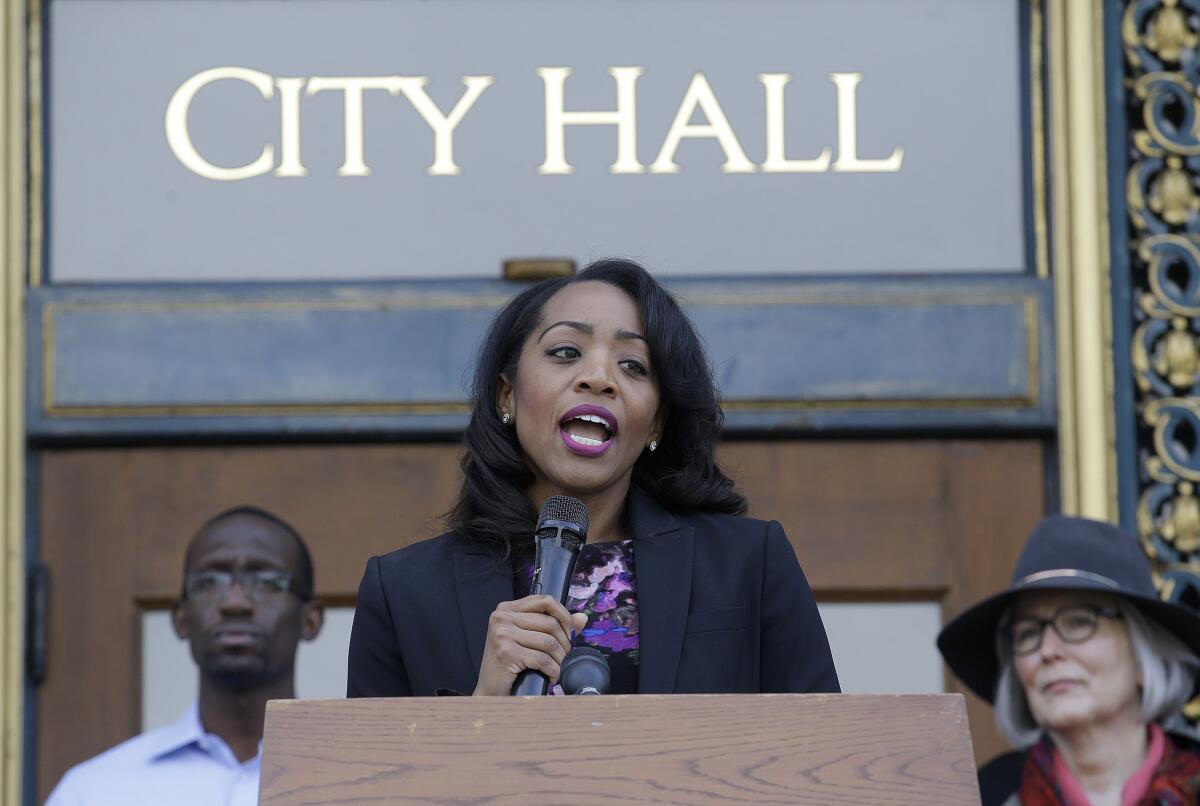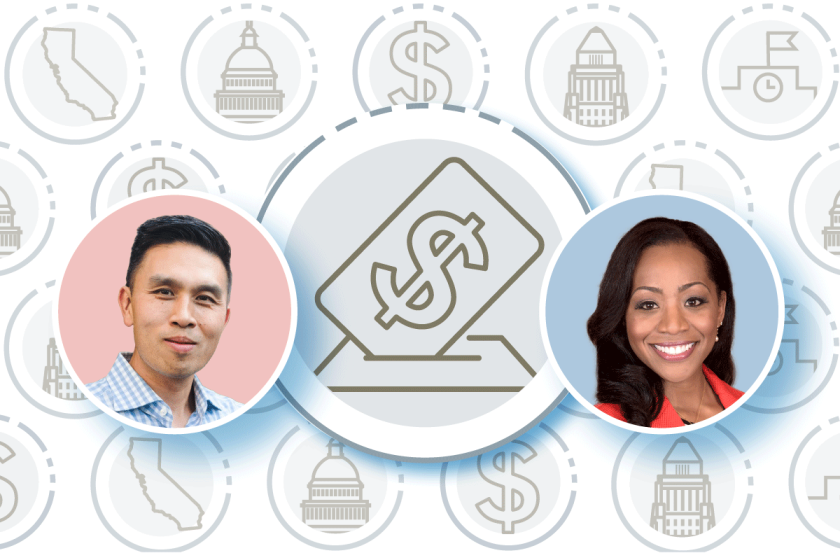Candidate’s financial history under scrutiny in California controller’s race

Malia Cohen is vying to become the chief fiscal officer for the most populous state in the nation, overseeing more than $100 billion in receipts and disbursements of public funds every year.
But the only Democrat in the November contest for California controller is facing scrutiny over the recent suspension of a business license and the foreclosure of her San Francisco condo more than a decade ago.
Her Republican opponent, Lanhee Chen, is pointing to Cohen’s personal financial problems in questioning her fitness for the office.
Franchise Tax Board records show that the license for Cohen’s social media consulting firm, Power Forward, was suspended for “failure to file” a tax return and “failure to pay” taxes in March 2021.
Cohen, who is chair of the Board of Equalization, told The Times that she could not remember why the license was suspended.
“I cannot explain what happened there because I don’t recall,” Cohen said. “I filed a closure for that before — I think it was in 2019 — because Power Forward wasn’t in operation.”
Later, through a campaign spokesperson, Cohen said the suspension came about after she missed mail because of an address change.
Cohen describes the foreclosure of her home as a traumatic experience that caused her a lot of embarrassment when it was brought up in her successful 2010 campaign for the San Francisco Board of Supervisors.
Here’s who has raised the most money and where it is coming from ahead of the 2022 California controller’s election.
She said the foreclosure bolstered her motivation to run for public office.
“I have learned from the experience and can coach and share my experience and talk to other people, and it has really made me a fierce advocate to hold corporations and banks accountable,” said Cohen, who holds a master’s degree in public policy and management from Carnegie Mellon University.
After eight years as a supervisor, Cohen joined the State Board of Equalization, which provides oversight on some areas of property, alcohol and insurer taxation, in 2019.
She served as chair of the board for a year and is chair again for 2022. As chair, she also holds a seat on the Franchise Tax Board and would remain a member if she becomes state controller.
David Beltran, a consultant with Bearstar Strategies and a spokesperson for Cohen, said her business partner closed the Power Forward account after discovering the lapse.
The Franchise Tax Board would not disclose the amount of money Cohen owed when the license was suspended because there is no longer an outstanding balance on the account. Records show that the tax issue was resolved and the firm’s license was restored this April. The account was closed the following month, just before the primary election, according to the records.
Cohen placed second to Chen — a fiscal advisor, Stanford educator and former policy advisor to U.S. Sens. Mitt Romney and Marco Rubio during their respective presidential bids — in the June 7 primary.
With one Republican, four Democrats and one Green Party candidate, Chen ended up with 37.2% of the vote. Cohen finished with 22.7%, besting the other Democrats in the race.
California’s 2022 election ballot includes races for governor, attorney general, Legislature and Congress, local contests and statewide propositions.
In the November election, Cohen is the sole Democrat running for controller in a state where Democrats outnumber GOP voters 2 to 1.
Chen has raised more money than Cohen, reporting $4 million in contributions with less than $1.2 million spent as of late September. Cohen reported nearly $2.3 million in contributions and has spent $1.8 million.
Though voters often pay scant attention to statewide races for constitutional offices, that hasn’t stopped Chen from calling out Cohen’s prior positions on social media and, now, questioning her ability to do the job of controller.
“How does Malia Cohen expect to be able to be the chief fiscal officer for one of the largest economies in the world when she can’t even handle her own finances?” Chen said.
Darry Sragow, a veteran strategist, said Cohen’s financial history is an easy target for Chen.
“There’s no way her opponent would not seize on this,” Sragow said. “It would be political malpractice on her opponent’s part to not try to make an issue of this.”
It remains to be seen whether the issue will make any difference to voters in the down-ballot contest.
“It depends in part on how she handles this,” Sragow said. “You just deal with it, and the faster you deal with it, the more likely you’re going to be able to get past it.”
Here’s how to vote in the California midterm election, how to register, what to do if you didn’t get mail ballot or if you made a mistake on your ballot.
=The foreclosure involved a two-bedroom, two bathroom condominium that Cohen purchased for $581,500 in December 2006.
She bought a top-floor unit in a new development on Crescent Way in Candlestick Point with no money down, financing the property with two separate adjustable-rate conventional loans, according to public records detailing the loan and foreclosure.
Cohen said the lender had an office at the development. She said she did not remember specifics about her decision to purchase the home with two loans.
“So, it was presented to me that I did not have flexibility to shop around,” Cohen said. “That is the way that it was suggested to me for it to be structured.”
Housing prices peaked in the U.S. months before Cohen bought her condo. The financial crisis that followed caused a dramatic decrease in the value of homes across California, including her 872-square-foot property.
Millions of Americans lost their jobs and ended up in foreclosures or short sales because they were unable to make their payments.
Cohen said her financial situation had started to improve between the time she bought the property — when she worked as a legislative aide to a member of the San Mateo County Board of Supervisors — and when she lost the home months before becoming a San Francisco supervisor. She said her interest rate had not increased.
But similar to many homeowners at the time, she said she owed far more on her condo than it was worth after the housing market crumbled. Having made no down payment, she found herself underwater.
California’s November election will feature seven statewide ballot measures.
She said she stopped making mortgage payments in hopes that the bank would renegotiate the terms of her loan — not because she couldn’t afford to pay.
“I received advice that told me, ‘Hold back your payments; save them to negotiate with the bank the refinancing of your loans,’” she said. “So my financial state didn’t change. It was the quality of advice that I received.”
She said the bank gave her the runaround for months or didn’t answer calls.
Wells Fargo Home Mortgage filed a notice of default on the property in January 2010, which stated that Cohen was $11,190.02 behind on her payments. The bank sold the property the following year for $320,000, according to public records.
Cohen said she did not remember how she came to the decision to walk away from the property.
“I cannot speak to where my head was being in that space,” she said. “I mean, it was traumatic. Honestly, I just don’t recall it anymore.”
Brent White, author of “Underwater Home,” was among the first experts to advise homeowners who were underwater to let their properties go during the financial crisis. Generally speaking, he said, too many people viewed a mortgage as a moral obligation instead of a business transaction.
“All these people were just piling on homeowners telling them they’re unethical, they’re immoral to not pay their bills,” White said. “People are maxing out their credit cards to pay their mortgage. They’re leveraging their kids‘ futures and college tuition accounts, making all kinds of terrible financial decisions under the misimpression that they have a moral obligation to pay their mortgage.”
Who is running for California governor? What are the propositions on the ballot? Here is your guide to the 2022 midterm election.
Buyers who did not make down payments on their homes were positioned to lose less money in a foreclosure than those who put money down, White said.
Cohen bounced back from the foreclosure and owns a home with her husband in San Francisco.
She said she stands by her decision to walk away from her property.
“I came out of this in the best possible way,” she said. “Yes, my credit score took a hit. But I acknowledge the fact that I was in a fortunate position to be able to still find an apartment, to be able to build that credit back up and have great credit and now have moved on and own other property in San Francisco.”
Times researcher Scott Wilson contributed to this report.
More to Read
Sign up for Essential California
The most important California stories and recommendations in your inbox every morning.
You may occasionally receive promotional content from the Los Angeles Times.
















